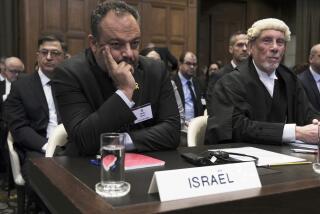Congo militia leader’s trial starts at The Hague
- Share via
LONDON — Thomas Lubanga, a Congolese militia leader facing charges of recruiting child soldiers to rape and kill, on Monday became the first defendant to go on trial at the International Criminal Court at The Hague.
The court is the world’s first permanent venue to prosecute war crimes, genocide and other major crimes against humanity. Cases such as these have mostly been tried at temporary courts, from Nuremberg, Germany, to more recent U.N. tribunals focused on Rwanda’s genocide and war crimes in the former Yugoslavia.
The opening of Lubanga’s trial suggests how powerful the court may be in deterring war crimes and providing a voice for victims. As Lubanga pleaded not guilty, his court appearance, and prosecution video of him in training camps with child soldiers, was broadcast live on giant screens in Congo’s war-ravaged northeast, devastated by years of attacks by militias like Lubanga’s.
People of the area, long used to militias enjoying near-impunity, “were completely transfixed,” said Alison Des Forges, a senior advisor on African issues for Human Rights Watch, who spoke Monday with colleagues in the Democratic Republic of Congo.
The new court will operate under a system in which victims of crimes are allowed to testify. Dozens are scheduled to do so during Lubanga’s trial, which is predicted to take at least several months.
Lubanga, charged with abducting children under 15 for use as soldiers, is just one of several Congolese militia leaders indicted by the International Criminal Court. Others facing prosecution, if they can be arrested, include Joseph Kony of northern Uganda’s brutal Lord’s Resistance Army, a rebel group built on kidnapped child soldiers. Several Sudanese officials also are charged with war crimes in Darfur.
The court’s first case represents “the beginning of a long road toward deterrence,” said John Prendergast, co-chairman of the Enough Project, an anti-genocide effort at the Center for American Progress in Washington.
For now, “one trial is not going to deter every criminal around,” Des Forges said, “but you have to start somewhere.”
--
More to Read
Sign up for Essential California
The most important California stories and recommendations in your inbox every morning.
You may occasionally receive promotional content from the Los Angeles Times.










